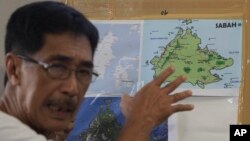MANILA —
When a group of more than 200 Filipinos entered a town in eastern Malaysia last month to reassert their centuries-old claim to the province of Sabah, it triggered a standoff that evolved into a military operation. So far, Malaysian authorities say 66 people have died in the fighting.
Since the start of the crisis, Malaysia has been calling on followers of the Sultanate of Sulu and North Borneo to surrender unconditionally. But the group loyal to the self-proclaimed sultan, Jamalul Kiram the third has refused to disarm.
They demanded talks with the Malaysian government to try to charge more for the yearly token payment they have received for Sabah since 1963, when Malaysia became independent of Britain.
The sultanate’s policy advisor, Almarim Centi Tillah says the increase is secondary to their main complaint.
"Malaysia has prospered [in] leaps and bounds, benefited [in] leaps and bounds out of our property. And you know in Islam… you cannot own the property of another Muslim unless it’s given to you," said Tillah.
Malaysia has continuously said that it owns Sabah, which has fertile ground for palm oil plantations. The country cites a favorable International Court of Justice 2002 ruling on its claims to islands off Sabah.
The Philippine government also has repeatedly called for the Kiram group to return or disarm. It's military and police are securing the small island provinces near Sabah to try to keep more followers from entering Sabah and intercept them as they leave.
The fighting has so far displaced about 1,500 of the roughly 800,000 Filipinos who live and work in Sabah. And Manila has appealed to Kuala Lumpur to keep its remaining citizens out of the fray. The Philippine government is monitoring human rights complaints of displaced Filipinos who fled Sabah.
Rommel Banlaoi, who heads the Philippine Institute for Peace, Violence and Terrorism Research, says the two countries have to tread very carefully.
"They’ll want to make the situation better because if this situation will deteriorate, the consequences on regional security will be very, very costly. So we [would] be facing another flashpoint," he said.
Banlaoi says the two countries along with eight others in the region all entered into an agreement to set aside competing claims when forming the Association of Southeast Asian Nations in 1967. He says earlier attempts to form a similar coalition failed because of the Sabah issue and other territorial rifts.
"They don’t want to raise the territorial conflicts to affect ASEAN solidarity otherwise Southeast Asia will crumble," he said.
Malaysia is the Philippines third largest trade partner in the Association of Southeast Asian Nations (ASEAN) and for 10 years it has held the role of facilitator in the Philippine government’s peace negotiations with the largest Muslim rebel group. The two sides signed a preliminary peace agreement in October while Malaysia’s prime minister and facilitator looked on.
Meantime, the Sultanate of Sulu and North Borneo policy advisor, Almarim Tillah says the group is looking to outside bodies such as ASEAN and the United Nations to raise their claim.
Since the start of the crisis, Malaysia has been calling on followers of the Sultanate of Sulu and North Borneo to surrender unconditionally. But the group loyal to the self-proclaimed sultan, Jamalul Kiram the third has refused to disarm.
They demanded talks with the Malaysian government to try to charge more for the yearly token payment they have received for Sabah since 1963, when Malaysia became independent of Britain.
The sultanate’s policy advisor, Almarim Centi Tillah says the increase is secondary to their main complaint.
"Malaysia has prospered [in] leaps and bounds, benefited [in] leaps and bounds out of our property. And you know in Islam… you cannot own the property of another Muslim unless it’s given to you," said Tillah.
Malaysia has continuously said that it owns Sabah, which has fertile ground for palm oil plantations. The country cites a favorable International Court of Justice 2002 ruling on its claims to islands off Sabah.
The Philippine government also has repeatedly called for the Kiram group to return or disarm. It's military and police are securing the small island provinces near Sabah to try to keep more followers from entering Sabah and intercept them as they leave.
The fighting has so far displaced about 1,500 of the roughly 800,000 Filipinos who live and work in Sabah. And Manila has appealed to Kuala Lumpur to keep its remaining citizens out of the fray. The Philippine government is monitoring human rights complaints of displaced Filipinos who fled Sabah.
Rommel Banlaoi, who heads the Philippine Institute for Peace, Violence and Terrorism Research, says the two countries have to tread very carefully.
"They’ll want to make the situation better because if this situation will deteriorate, the consequences on regional security will be very, very costly. So we [would] be facing another flashpoint," he said.
Banlaoi says the two countries along with eight others in the region all entered into an agreement to set aside competing claims when forming the Association of Southeast Asian Nations in 1967. He says earlier attempts to form a similar coalition failed because of the Sabah issue and other territorial rifts.
"They don’t want to raise the territorial conflicts to affect ASEAN solidarity otherwise Southeast Asia will crumble," he said.
Malaysia is the Philippines third largest trade partner in the Association of Southeast Asian Nations (ASEAN) and for 10 years it has held the role of facilitator in the Philippine government’s peace negotiations with the largest Muslim rebel group. The two sides signed a preliminary peace agreement in October while Malaysia’s prime minister and facilitator looked on.
Meantime, the Sultanate of Sulu and North Borneo policy advisor, Almarim Tillah says the group is looking to outside bodies such as ASEAN and the United Nations to raise their claim.




